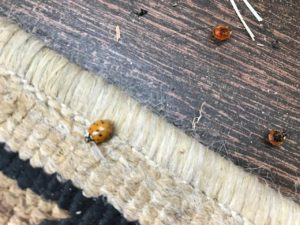There has been a rash of calls, emails, texts, and questions regarding lady beetles that have been seen in high numbers lately in Central Texas. We all know that ladybugs are good bugs, right? Well, not this time. That should make you ponder “What makes a good bug or a bad bug?”. My answer to that would be it depends not only upon the insect in question, but also where it is found and what it is doing. If you find an termite in your house, is it a pest? It depends. Normally when you find a termite in your house, it is in relation to feeding on cellulose and leading to structural damage. In that case, then yes, it would be a pest. If you randomly happen upon a termite that fell on the floor from a piece of firewood you brought in, then it wouldn’t be a pest in that case since it is there incidentally. Likewise, if you have a ladybug in your house and it just flew in from outside and just happens to be there, then it’s not really a pest. Flipping that will create the situation that I’ve been getting questions on recently.
There are some types of ladybird beetles (a.k.a. ladybugs) that will crawl into cracks and crevices around homes when it gets cold outside. They, like you (or at least me, for sure, since I moved to Texas to get away from snow and long winters), want to seek out a warm spot to hang out on those chilly days. When they discover a route that leads them all the way inside the structure, they can become active due to the temperatures we maintain inside to make ourselves comfortable. This allows the ladybugs to remain active and flying around inside.
Unfortunately, these ladybugs can cause staining on fabric, are smelly when they die and sometimes will bite.
If you already have them inside, then I suggest that you get out your vacuum and suck them up. If you have them congregating outside the structure, then I would refer you to my post on EXCLUSION to prevent them from moving indoors.